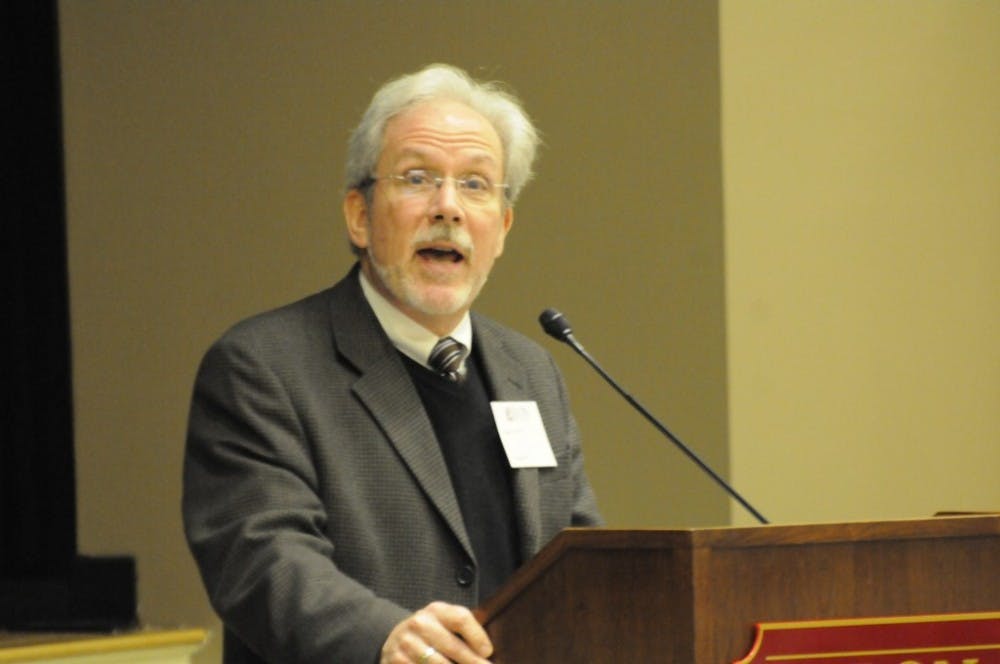The debate over Amendment One, legislation that recognizes marriage only as a union between man and woman, has sparked conversations regarding marriage equality, social approval and basic human rights. But the conversations haven’t been limited to the upcoming ballot in North Carolina. Individuals across the globe have voiced their opinion on topics such as sexuality and religion and the institution of marriage.
Marvin Ellison, a gay ordained Presbyterian minister and widely published author, spoke on these topics Feb. 24 as part of a day-long colloquium on religious discourse in same-sex marriage debates hosted by the Elon Center for the Study of Religion.
“You and I are not alone in this conversation or in this struggle about the future of marriage,” Ellison said. “Much is afoot, both here in North Carolina, but also around the world. It seems that almost whenever two or more are gathered, there will likely be conflict or at least intense conversation about marriage, family rights and same-gender loving people.”
Ellison, whose talk was titled “Is same-sex marriage a ‘must’ or a ‘bust,’” said there are three voices in the same-sex marriage debate. The first voice is that of marriage traditionalists, who resist marriage equality because they fear it will erase gender differences. Marriage advocates represent the second voice, who feel marriage exclusion is a form of discrimination that violates equal protection under the law. They believe the debate is not just about homosexual marriage, but rather confirming the highest form of social approval possible.
The third voice is that of marriage critics, who support the right of same sex couples to marry but are not convinced it will inevitably lead to greater relational justice.
“For marriage critics, same-sex marriage is an ambivalent good,” Ellison said. “If not quite a bust, not entirely a must.”
Ellison himself is also skeptical of placing too much emphasis on legalizing same-sex marriage.
“While gaining equal access to marriage is a worthy goal, I fear that limiting justice to the acquisition of equal rights may in fact be problematic,” he said. “Especially if other compelling requirements of justice are ignored.”
During a sabbatical leave in 2002 and 2003, Ellison was inspired to write his book “Same-sex marriage: A Christian Ethical Analysis” after realizing he had yet to find a progressive, justice focused Christian voice that could contribute directly to marriage debates.
“Little did I know what an interesting and complicated and hotly contested topic marriage would turn out to be,” Ellison said. “Not just marriage for same-sex couples, but marriage, period.”
While writing his book, Ellison discovered that historically, Christians have often been on the wrong side of marriage debates. But in Biblical traditions, justice is meant to right relation both interpersonally as well as communally, he said.
“(Justice) is about showing respect for persons and honoring their humanity,” Ellison said. “To deny, therefore, a group of people the freedom to marry and the moral right to love and be loved is therefore not a minor inconvenience or merely unpleasant, it is rather an exclusion that is dehumanizing, unjust and wrong.”
For many centuries, the purpose of marriage for most Christians was to restrain sin and to regulate sexual passion, Ellison said. While men and women were considered spiritual equals, they were not socially equal. But Christianity, Ellison said, is engaged in a dynamic evolving process that has resulted in a shift in the meaning of sex, marriage and intimate love.
Ellison said he would encourage the church to not view marriage as a duty expected of all people. He said the church should promote only egalitarian, justice-loving marriages and other intimate relationships.
“I would encourage all of us, in our own ways, to become wedding industry resistors,” he said. “Why not place marriage ceremonies back within the context of public worship. Friday night in the synagogue or Sunday morning in the church, and then follow the ceremony with a spiffy coffee hour.”
Ellison shared the results from research that indicate that moveable middle voters on LGBTQ rights can be described as conflicted Christians.
They are not anti-gay, but have never heard a compelling gay-positive faith-based argument in support of LGBTQ equality and justice, Ellison said.
“The research indicates that conflicted Christians want to be supportive of gay and lesbian persons, but they cannot imagine how their faith values and commitment could ever allow them to make this move,” Ellison said. “Theology trumps their support of LGBTQ rights.”
The solution is finding the right messenger, Ellison said. The more local and trusted the messenger, the more persuasive the message will be. But within the solution lay a problem — faith leaders have not been willing to translate their personal support into public leadership.
“Fearful of conflict, concerned about their ability to pastor to all people and unprepared to preach and teach about sexual justice, these faith leaders have fallen silent and too often try to remain neutral on these matters,” Ellison said. “But that strategy of being neutral actually raises the anxiety levels in congregations.”
But, as Ellison emphasized, change is possible, and while inclusion is good, transformation is better. Expanding marriage rights is important, but an agenda that aims at relational justice for all, rather than legal remedy for a few, is what the focus needs to be on, Ellison said.
“The change many of us desire so deep down is not mere inclusion but rather spiritually, moral, economical and cultural transition toward genuinely right relations,” Ellison said. “From the grassroots upwards, and in our bedroom and far beyond.”


